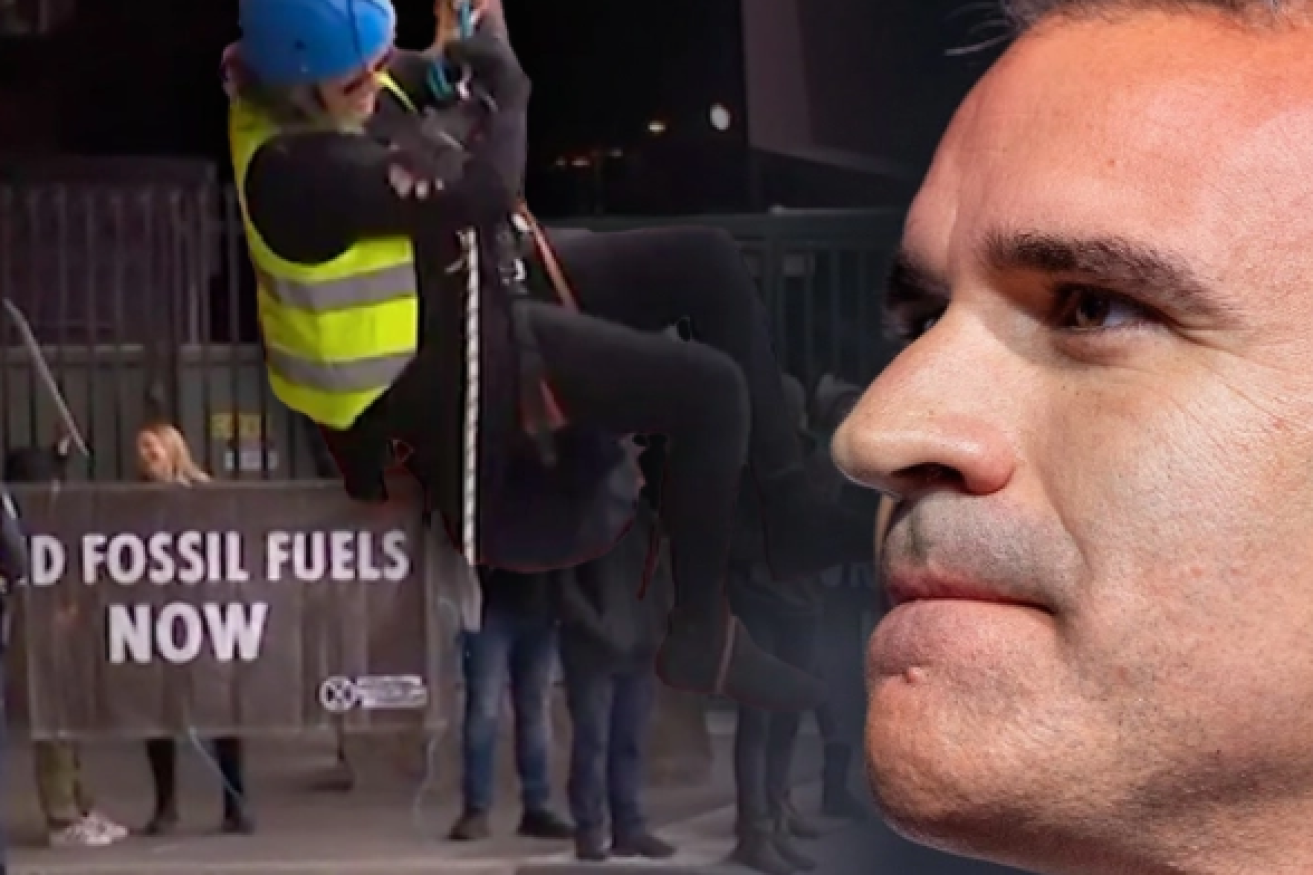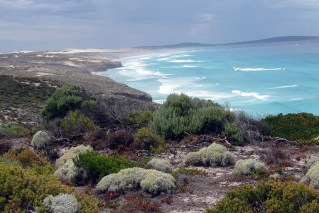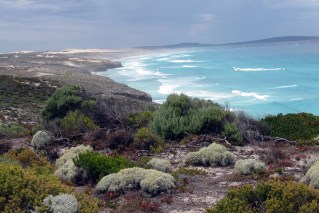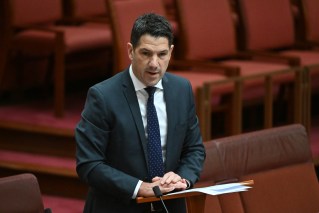SA rushes through tougher laws for climate protests

Premier Peter Malinauskas has backed an Opposition push to crackdown on protests that obstruct public places. Photo: InDaily
The South Australian parliament has rushed through a government bill to lift the fine for public obstruction from $750 to $50,000 or three months’ jail as it faces a wave of climate change protests in Adelaide.
The state opposition said early on Thursday it would introduce amendments to SA’s Summary Offences Act to increase the maximum penalty for obstructing a public place from $750 to $50,000, or three months prison.
The bill, drafted by the opposition on Wednesday, would also allow courts to order a guilty defendant to reimburse police and emergency services for the costs associated with removing them from an obstructive protest. Premier Malinauskas backed the move and said he would ask the Attorney-General to help draft amendments.
Introducing a government bill to parliament just after midday on Thursday, Mr Malinauskas said the $750 fine for public obstruction was “plainly inadequate”.
“It is clear that improvements can be made to make the offence more effective in being able to deal with the type of conduct that we’re seeing, as well as making it clear that obstruction of the kind – that forces our emergency services to close roads and other public places – falls within the ambit of the offence,” he said.
“The government considers that protestors speaking up about issues is an integral part of our vibrant democracy and the government does not seek to prevent members of the community from having their say.
“However, the recent activities have seen people being put at risk, disrupting members of the community when they are trying to go about their daily lives.
“[It] interrupts businesses unnecessarily, tying up the resources of our emergency services personnel unreasonably.”
The bill passed SA’s lower house with opposition support about half an hour later. It must still pass the upper house, where the Greens have flagged concerns.
The move comes amid protest action by Extinction Rebellion, directed at the Australian Petroleum Production and Exploration Association conference being held at the Adelaide Convention Centre.
Mémé Thorne, a 69-year-old protestor from Willunga, was arrested on Wednesday after dangling from the Morphett Street Bridge above North Terrace for about 90 minutes, forcing peak hour traffic to be diverted.
Ms Thorne was charged with obstructing a public place and released on $500 bail.
On Thursday morning, Extinction Rebellion protestors threw paint at oil giant Santos’ Flinders Street office. More protests were planned for Thursday afternoon.
Four people were arrested and charged with property damage on Thursday morning: A 68-year-old woman and 50-year-old man from Victoria, a 49-year-old woman from NSW and a 66-year-old man from Flagstaff Hill.
The new laws will not strengthen penalties for throwing paint on a building.
They will, however, change the wording in legislation from “wilfully” obstructing a public place to “intentionally or recklessly”.
Opposition Leader David Speirs, who on Wednesday labelled Extinction Rebellion “out of touch, greenie lefty losers”, said $750 for obstructing a public place “doesn’t cut it”.
“It’s time for South Australia to get serious about these sorts of protests,” he said on Thursday.
“When you mess up our city like those protestors did the other day, you deserve to pay.”
Asked if the legislation was too heavy-handed, Mr Speirs said $50,000 was a maximum penalty.
“I wouldn’t expect a magistrate or judge to use the $50,000 on an ongoing or regular basis, but it does give them the option, and so does the three months imprisonment,” he said.
“If you were to obstruct someone in a way that resulted in serious illness or potentially worst case scenario death, there should be the opportunity for something stronger in the magistrate’s toolkit so that they can hand down a tougher penalty.”
Tweet from @theTiser
Mr Malinauskas said the government would support the opposition’s proposal.
“I think the Leader of the Opposition is right, I think there’s an opportunity for the parliament to respond to this action quickly,” he told ABC Radio Adelaide.
“We can’t have a situation where innocent people who are just trying to serve the community are having their lives and their incomes completely disrupted through the acts of people who abuse the right to protest in our state.
“I’ve asked the Attorney-General this morning to work with the opposition to draft up a piece of legislation that hopefully we can get into the parliament today along the lines that the Leader of the Opposition just referred to.
“No one wants to impinge upon the capacity for the right of freedom of association, peaceful assembly, protest, but this is just taking it a little bit too far.
“I don’t think anyone in the community reasonably believes we should allow that to occur un-responded to or with impunity.”
Mr Speirs said he welcomed the government’s support for the crackdown.
“I want to see good quality legislation that meets the expectations of South Australians … I’m delighted the government has indicated support for the spirit of this legislation,” he said.
“I look forward to seeing it quickly passed through the parliament.”
But the bi-partisan crackdown has already attracted criticism from the SA Greens, who want the legislation delayed until “the full implications can be considered by the parliament and the community”.
“It’s a chilling thing to hear the major parties talking about working together to curtail the right to protest in our democracy,” Greens MLC Robert Simms said.
“Draconian anti protest laws were rushed through state parliament in NSW, it’s very alarming to hear that South Australia may be next.
“The right to peaceful protest and civil disobedience are fundamental to our democracy.”
In April last year, NSW passed laws that created fines of $22,000 or a maximum two-year jail sentence for people who protest illegally on public roads, rail lines, tunnels and bridges.
The laws attracted international criticism when climate activist Deanna “Violet” Coco was sentenced to 15 months’ jail with eight months non parole for obstructing traffic on the Sydney Harbour Bridge for about half an hour.
Ms Coco’s sentence was quashed by a court on appeal. She spent 18 days in jail.
The United Nations special rapporteur on peaceful assembly, Clément Voule, and Human Rights Watch criticised the initial sentencing decision, describing it as unprecedented and alarming.
Last year, Victoria introduced $21,000 fines and maximum 12-month prison sentences for forestry protestors that interfere with timber harvesting.
In 2019, Queensland strengthened fines for “locking devices” – such as ropes, chains or handcuffs – used by protestors to chain themselves to public places. The maximum penalty is up to two years jail.
Extinction Rebellion SA has been contacted for comment.
This article first appeared in InDaily and is republished here with permission








